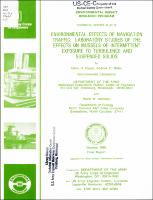Please use this identifier to cite or link to this item:
https://hdl.handle.net/11681/24823| Title: | Environmental effects of navigation traffic : laboratory studies of the effects on mussels of intermittent exposure to turbulence and suspended solids |
| Authors: | Payne, Barry S. Miller, Andrew C. Aldridge, David W. |
| Keywords: | Inland navigation--Environmental aspects Freshwater mussels Turbidity--Environmental aspects |
| Publisher: | Environmental Laboratory (U.S.) U.S. Army Engineer Waterways Experiment Station. |
| Series/Report no.: | Technical Report;EL-87-14 |
| Abstract: | Navigation traffic can intermittently increase turbulence and suspended solids in rivers. Freshwater mussels are essentially sessile filter-feeders and could be susceptible to physiological disruption as a result of exposure to these potential effects of navigation traffic. In laboratory studies, cyclic increases in water velocity and turbulence at a level and frequency that can be caused by routine navigation traffic led to reduced feeding rates and slightly increased reliance on endogenous and nonproteinaceous energy reserves. However, continuous or near-continuous disruption, such as might be associated with barge fleeting activities, led to virtually complete reliance on endogenous energy reserves. These results suggest that proposed areas of barge fleeting be evaluated on a site-specific basis to ensure that important mussel populations are not situated in nearby habitats that will be exposed to sustained periods of turbulence and suspended solids above ambient conditions. In addition, these laboratory studies confirm the utility of sublethal physiological indices of stress, such as oxygen:nitrogen and flesh:shell mass ratios, in field studies aimed at monitoring environmental impacts on natural mussel populations. |
| URI: | http://hdl.handle.net/11681/24823 |
| Appears in Collections: | Technical Report |
Files in This Item:
| File | Description | Size | Format | |
|---|---|---|---|---|
| TR EL-87-14.pdf | 3.36 MB | Adobe PDF |  View/Open |